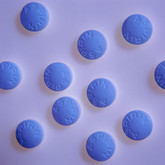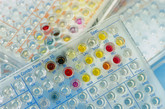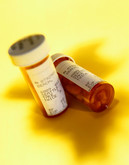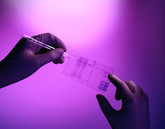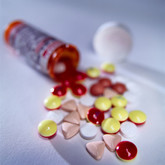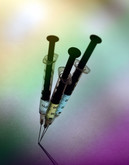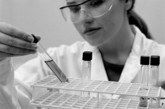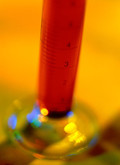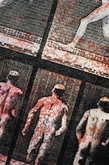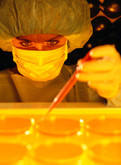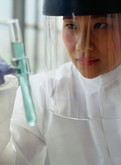Pharma News
Mylan in and out of hot water
On 26 January 2011 Mylan, the second-largest US generics manufacturer, announced a truce with global pharma giant Pfizer, which will enable the former to sell generic versions of the cholesterol drug Lipitor (atorvastatin) and combination blood pressure and cholesterol treatment Caduet (amlodipine/atorvastatin).
Valeant acquires generics’ manufacturer PharmaSwiss
Valeant Pharmaceuticals International and PharmaSwiss announced on 1 February 2011 that they had signed a binding agreement for Valeant to acquire generics’ manufacturer PharmaSwiss for Euros 350 million. Valeant expects the deal to strengthen its presence in Central and Eastern Europe.
Rights to Allegra acquired by generics’ manufacturer Perrigo
On 29 June 2010, Perrigo announced that it had acquired the exclusive US rights to sell and distribute OTC versions of Fexofenadine HCl 180 mg and 60 mg tablets, plus Fexofenadine HCl 60 mg and Pseudoephedrine 120 mg tablets, the generic versions of sanofi-aventis’ Allegra and Allegra D-12 products. Teva Pharmaceutical Industries currently has prescription (Rx) approval for these products, and Teva and sanofi-aventis have settled their Paragraph IV litigation.
Perrigo buys Paddock for US$540 million
Perrigo Company may not be a household name, but nevertheless life is exciting for a medium-sized company in the pharmaceuticals world. Undeterred by a pending FDA warning letter about its Michigan facility, Perrigo recently entered into a definitive agreement to take over Paddock Laboratories in a cash deal worth Euros 394 million.
Teva increases stake in Mediwound to 51%
Israel’s Teva Pharmaceutical Industries is increasing its stake in biotechnology company MediWound Ltd to 51% under a multi-tiered deal to develop and commercialise products to treat burns and wounds.
Ranbaxy’s profits soar, but US ban still looms
The generics’ giant and India’s largest pharmaceutical manufacturer, Ranbaxy, has reported strong results for the third quarter of 2010, but concerns remain about the US import ban that is still in place on many of the firm’s generics.
Cost of new drug challenged
An editorial in the New England Journal of Medicine (NEJM) issue of 23 September 2010 took the unusual position of challenging a study published in the same issue.
Pfizer buys 40% stake in Brazilian generics’ manufacturer Teuto
Pfizer, the world's biggest pharma company, is increasing its stake in emerging markets, with its announcement on 20 October 2010 that it has entered into an agreement to acquire a 40% stake in Brazilian generics’ manufacturer Laboratorio Teuto Brasileiro (Teuto) for US$240 million.
China’s booming pharmaceutical market attracts R & D
China, which is approximately the size of the US, but with five times the population, has long been off-limits for global pharma due to its complex regulations, low healthcare expenditure and its seemingly unenforceable intellectual property laws. However all that has apparently changed according to a Reuters analysis, which shows that China is grabbing an increasing share of the global R & D budget, with investigators launching new studies to help understand how to treat the country’s huge population and tap into one of the fastest growing pharma markets on the planet.
Safe supplies consortium hard at work
Perhaps frustrated at the length of time required for action on counterfeit drugs by the EMA or the FDA, and the limited powers of each of these bodies, a group of individuals got together last year to do things their own way. The Interim Director of Rx‑360, a new non-profit international pharmaceutical consortium, was Mr Martin Van Trieste, Vice President of quality for Amgen.
Daiichi Sankyo pursues a global strategy
In Japan, Daiichi Sankyo has won its first worldwide marketing approval. The drug is laninamivir - long-acting neuraminidase inhibitor. The firm will market the drug as Inavir.
Fresh directions for Sinobiomed
Sinobiomed Inc announced the appointment of a new President and Chief Executive Officer on 2 September 2010. Mr George Yu completed his education in Germany and the US. Under his experienced guidance the company hopes to move swiftly on the following strategic initiatives:
FDA generics division officer joins Teva
Teva Pharmaceutical Industries has added to its team Mr Gary Buehler, former head of the generics division at the FDA, The Wall Street Journal reported. Mr Buehler joins Teva as vice president of regulatory strategic operations.
Endo acquires US generics’ giant Qualitest
Endo Pharmaceuticals is buying US generics’ giant Qualitest Pharmaceuticals for about Euros 850,000 in cash to expand its portfolio of pain drugs. This is its second acquisition in as many months; last month it acquired Penwest Pharmaceuticals for just over Euros 100 million. Shares in US-based Endo were on the rise following the news.
Bristol-Myers Squibb looking stronger than expected
Plavix (clopidogrel bisulfate), which prevents blood clots in patients at risk of heart attack or stroke and is the world's second biggest-selling prescription drug, loses US patent protection in November 2011. Bristol-Myers Squibb markets the drug in the US, while its partner sanofi-aventis sells it in other countries. Bristol-Myers got almost a third of its 2009 revenue from Plavix—Euros 4.6 billion out of a total of Euros 14.1 billion—and is racing to find new drugs to fill the gap.
Mylan granted US restraining order over sales of paroxetine
Generics’ giant Mylan Laboratories was granted a US court order in September 2010 prohibiting Apotex, a Canadian pharma company, from selling paroxetine. The order also prohibits GlaxoSmithKline (GSK) from supplying Paxil CR (paroxetine extended-release tablets) to Apotex. Mylan has an exclusive agreement to sell a copy of GSK’s Paxil CR. If GSK were to authorise additional sales of generic paroxetine this would undercut sales and cause an “irretrievable loss of market share and customers” for generic Paxil CR, a Mylan spokesman said.
Spotlight on Bosnia
In today’s global business environment, companies battle for position all over the world. Today Bosnia’s pharmaceutical industry is making the headlines, with a battle to invest in the leading company, Bosnalijek.
Teva bruised in Copaxone fight
Copaxone (glatiramer acetate) is generic’s giant Teva Pharmaceutical Industries’ proprietory multiple sclerosis (MS) treatment, which netted the company Euros 1.17 billion in the first half of 2010. This success story, however, is now tainted with allegations that Teva performed an unethical clinical trial.
Sun Pharma finally wins battle for Taro
On 21 September 2010 India-based generics manufacturer Sun Pharmaceutical Industries (Sun Pharma) announced that it had acquired a controlling stake in Israel generics’ firm Taro Pharmaceuticals Industries after a prolonged legal battle.
AstraZeneca expands its generics business with Indian agreements
In line with its continued mission to supply branded generics to emerging markets, such as Africa and Latin America, AstraZeneca has entered into yet another agreement with an Indian generics firm.
Actavis plans entry to biosimilars market with Bioton agreement
In a press release on 7 September 2010, Icelandic generics’ manufacturer Actavis announced that it plans to enter into the field of biosimilars with an agreement with Polish biotechnology company, Bioton.
Ranbaxy to transfer R & D and focus on generics
On 2 July 2010, the Japanese Daiichi Sankyo Group and Indian-based Ranbaxy Laboratories announced that Ranbaxy’s New Drug Discovery Research (NDDR) has been transferred to Daiichi Sankyo India Pharma as part of the strategy to strengthen the global Research and Development (R & D) structure of the Daiichi Sankyo Group.
Ranbaxy to pay FDA to end impasse on manufacturing ban
Daiichi Sankyo hopes that its interventions may lead to a lift of the FDA’s import ban on 30 products from Ranbaxy, its Indian generic drugs arm.
Sun Pharma blocks Wockhardt settlement
Troubled generics’ firm Wockhardt is set to raise US$100 million via its foreign currency convertible bonds (FCCBs). However, fellow Indian generics’ manufacturer, Sun Pharma, has objected to the deal, amongst much speculation as to what Sun Pharma’s intentions are.
Teva increases its global position with acquisition of Ratiopharm
Generics are becoming an increasingly lucrative market with good prospects for the future. However, a report by US market data provider BCC Research shows that this is also a bit of an exclusive club. The top four global generics manufacturers in 2009 – Teva, Sandoz, Mylan and Watson – accounted for 40% of the world market.
The global generic medicines market
The global market for generic drugs was worth an estimated US$84 billion for 2009 and is expected to increase to a staggering US$168.7 billion by 2014.
Generics’ manufacturer Hospira merges with Javelin
On 22 June 2010, Hospira announced that it had successfully acquired 79% of the stock in Javelin Pharmaceutical’s. The merger agreement also allows for Hospira to exercise a ‘top-up’ option to increase its share ownership in Javelin, which, states Hospira, it fully intends to do.
Sanofi-aventis and Nichi-Iko announce joint venture for generics in Japan
Sanofi-aventis and Nichi-Iko Pharmaceutical Co., Ltd. (Nichi-Iko) have announced that they have signed an agreement to establish a new joint venture, called sanofi-aventis Nichi-Iko KK, in order to develop a generic business in Japan.
Orchid acquires US generic sales and marketing company Karalex
On 10 June 2010, Indian-based generics manufacturer, Orchid Chemicals & Pharmaceuticals (Orchid) announced that it had entered into an agreement to acquire Karalex Pharma, LLC, a US-based generic marketing and sales services company with headquarters in New Jersey, USA.
GSK acquires Argentine generics’ maker Laboratorios Phoenix
On 10 June 2010 GlaxoSmithKline (GSK) acquired Laboratorios Phoenix, a leading Argentine pharmaceutical business, for approximately US$253 million. GSK will gain full ownership of Phoenix in a move to accelerate sales growth and further extend its pharmaceutical portfolio in Argentina and the Latin America region.
Abbott acquires Indian generics’ maker Piramal Healthcare
The US-based company, Abbott, agreed to buy the domestic unit of Piramal Healthcare, one of India’s biggest generics makers, for US$3.7 billion.
EGA welcomes MEPs decisions on falsified medicines and pharmacovigilance reports
On 27 April 2010, ENVI (The Committee on the Environment, Public Health and Food Safety) of the European Parliament voted to adopt reports on both falsified medicines and pharmacovigilance. The measures included in these reports are intended to increase patients’ safety. This can only be good news for the generics sector, as this should result in increased consumer confidence and as a result encourage acceptance and increase sales of generics.
IMS Health Top 20 pharmaceutical companies 2009
The 2009 list of the top 20 pharmaceutical companies, ranked by IMS Health according to global prescription drug sales for the 12 months up to September 2009, shows that Teva, Novo Nordisk and Boehringer Ingelheim scored better in percent change than Big Pharma in those months.
IMS Health, BCC: Generics sales continue to climb
Over the 12 months that ended September 2009, global sales of generics grew by 7.7%, up from 3.6 % the year before, IMS Health reported. This compares with the 5.7% growth seen within the overall global pharmaceutical universe in 2009.
Global generics: time for consolidation and expansion
The global generic drug industry has witnessed an almost decade-long sales euphoria. Volumes and sales growth of prescription generic drugs continued to increase in 2009. At the same time, large companies are consolidating their operations in established markets and/or expanding into emerging ones through local acquisitions or partnerships.
After generics slow down in 2013: into biosimilars
Large pharmaceutical companies are consolidating their generics operations in established markets and/or expanding into emerging ones through local acquisitions or partnerships, writes Ms Doris de Guzman on ICIS website of 10 February 2010.
Originator/generic competition: who's the 'bad guy'?
As reported in Scrip News on 28 January 2010 by Xavier Buffet Delmas and Laura Morelli of Hogan & Hartson MNP, Paris, intellectual property rights are key elements of the fierce competition between originator and generics companies. Patents are central because it is only when patents elapse that generic products can enter the market. This is when competition in the market begins. Trademarks, trade dress and other marketing tools then come into play. The authors explain some interesting recent legal developments linked to this battle.
Indian Ranbaxy buys Biovel to strengthen in vaccines and follow-on biologics
Ranbaxy Laboratories in India (now part of Daiichi Sankyo) has strengthened its vaccine and biologicals manufacturing capabilities by acquiring India-based Biovel Lifesciences.
Pharmalot: Are pay-for-delay deals good or bad?
On 13 January 2010, the Federal Trade Commissioner (FTC) Jon Leibowitz held a press conference to deride the ongoing practice in which brand-name drugmakers offer cash or some other inducement to their generic rivals, which, in turn, agree to delay the marketing of lower-cost copycat medicines.
PhRMA threatens to withdraw US healthcare reform support
As reported by PharmaTimes on 18 January 2010, US research-based drugmakers have threatened to withdraw their support for US President Barack Obama’s healthcare reforms unless biological drugs receive 12 years’ guaranteed protection from generic competition.


